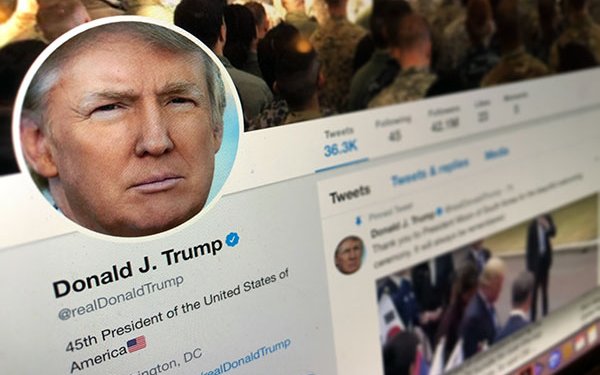Blocked Twitter Users Press Judge To Order Trump To Restore Access
- by Wendy Davis @wendyndavis, November 6, 2017

A group of Twitter users who were blocked by President Donald Trump after expressing criticism are urging a judge to order Trump to unblock their accounts.
The blocked users argue in new court papers that Trump's Twitter account is "akin to a digital town hall," and that excluding them based on their political views violates their right to free speech.
"The President’s Twitter account, @realDonaldTrump, has become an important source of news and information about the government, and an important forum for speech by, to, and about the President," the users argue in a motion for summary judgment filed Friday with U.S. District Court Judge Naomi Reice Buchwald in New York.
"The account is akin to a digital town hall, with the President speaking from the podium at the front of the room and assembled citizens responding to him and engaging with one another about the President’s statements," they add. "Defendants’ blocking of the Individual Plaintiffs violates the First Amendment because it restricts their access to generally available government information in retaliation for their criticism of the President."
advertisement
advertisement
The legal dispute dates to July, when seven blocked Twitter users and Columbia University's Knight First Amendment Institute sued Trump over the blocks. Twitter users who are blocked from Trump's account can't view his tweets or replies while logged in; if those users sign out of Twitter, they may still be able to view the posts. Blocked users are also restricted from commenting in some threads -- though there are workarounds.
The blocked users allege that Trump's Twitter account is a "public forum," meaning that it is comparable to city streets, parks and other locales where the government can't censor speech based on people's views.
In addition to Trump, the users are also suing Director of Social Media Daniel Scavino and former White House Press Secretary Sean Spicer. The users want Buchwald to declare the blocks unconstitutional, and to order the White House to unblock them.
Last month, the Justice Department asked Buchwald to throw out the lawsuit. Among other arguments, DOJ says that Trump's Twitter account, which he created in 2009, while still a private citizen, isn't a public forum, but a channel for him to express his views.
The blocked users counter in their most recent court papers that the account now functions as a channel for official communications. They point to one of Trump's tweets from earlier this year, which read: “My use of social media is not Presidential -- it’s MODERN DAY PRESIDENTIAL.”
The users also note that federal agencies and judges have treated the account as offering official statements. For instance, the 9th Circuit Court of Appeals mentioned one of the accounts tweets in an opinion blocking Trump's attempt to ban immigration and travel from seven Muslim-majority countries.
"Against this background, it is plain that the @realDonaldTrump account is being used as an instrument of governance, and accordingly that it is subject to the First Amendment," they argue.
Trump isn't the only public official facing suit for blocking people on social media. Kentucky Governor Matt Bevin, Maryland Governor Larry Hogan and Maine Governor Paul LePage also are facing suit over allegations that they blocked critics on Twitter or Facebook.
Questions about whether these blocks violate the constitution have not been definitively resolved by the appellate courts. But this summer, a federal district court judge ruled that an official in Virginia violated a resident's First Amendment rights by briefly blocking him on Facebook.


